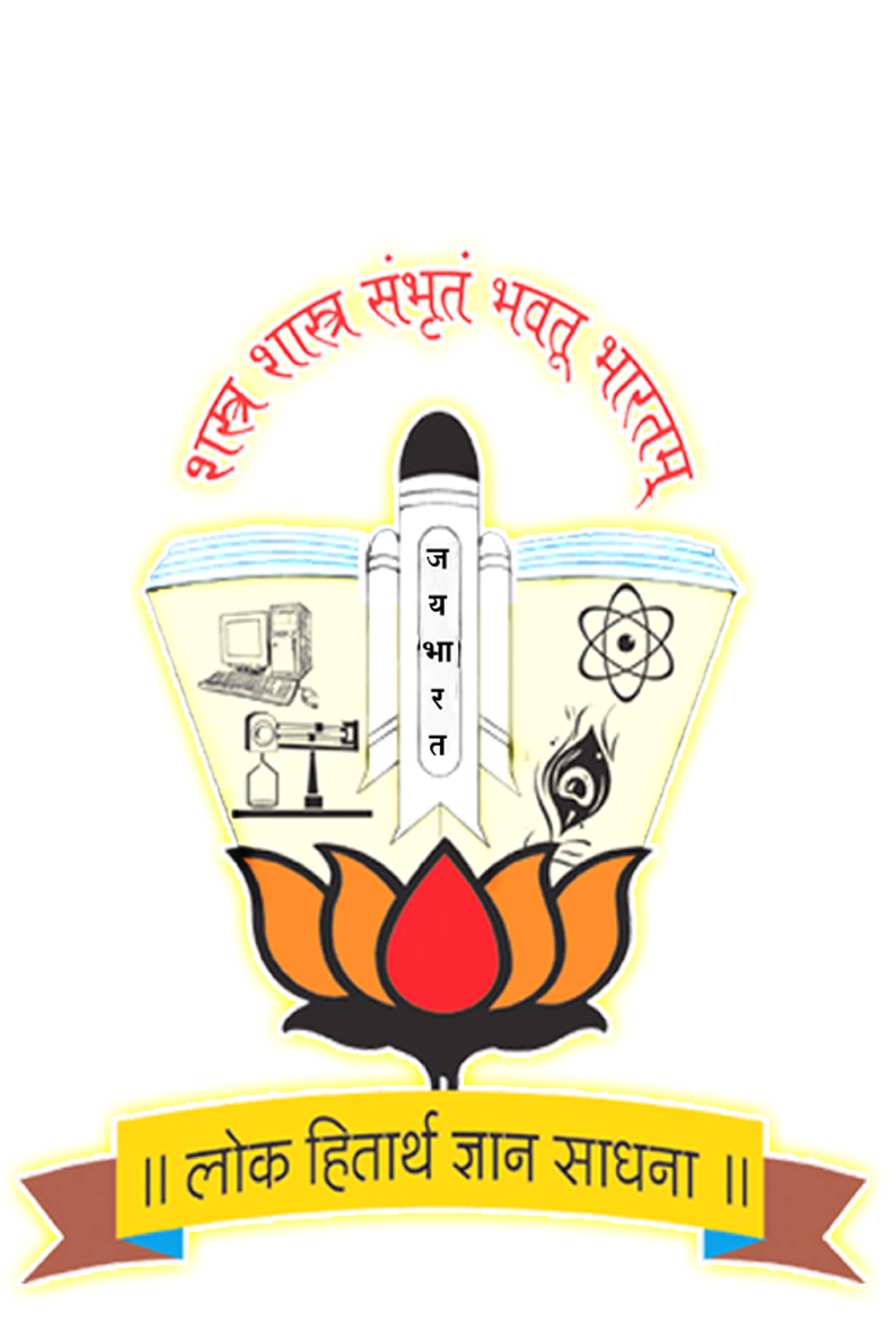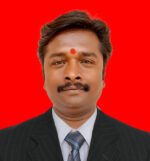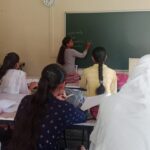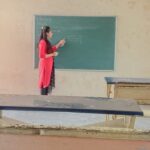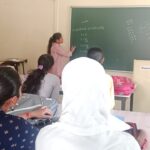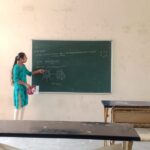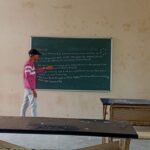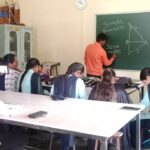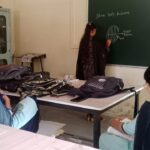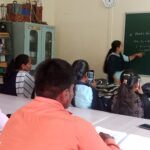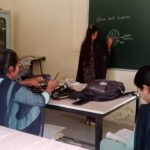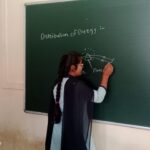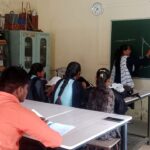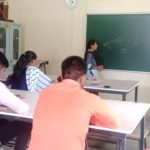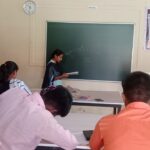Welcome to Department of Physics
About Department
Vision:
Established a platform for the creation and sharing of knowledge by engaging students in physics education and research at graduation levels. To contribute the development of a scientific society in India that values reason.
Mission:
To provide cutting-edge academic programme in Intradisciplinary and physics. To develop intellectual property through original ideas, high-caliber research outputs, and patents.
About Department
Department of Physics was established in 2000. The Department has rich teaching and research traditions Initiated. Presently department of Physics has its own well equipped laboratory. The Department offers six semesters undergraduate B. Sc. The choice based credit system (CBCS) has been implemented. The intake for the undergraduate programme is 120 respectively. Besides these, the Department also offers program in various research areas of experimental and theoretical physics. The Department’s illustrious legacy and its continuous stride in academic excellence over many decades have been duly acknowledged by the University Grants Commission, New Delhi.
The Department has an excellent Departmental library with more than 25 reference books. Eminent Faculty who at some point of time were the faculty member / student of the Department are Dr. Laxman Chikhale and Mr. Prashant Gurav.
Program Offered
| Sr. No | Programme | Eligibility |
|---|---|---|
| 1 | B.Sc Physics | B.Sc Physics is a 3-year undergraduate course for students who wish to make a career in Arts and research. •B.Sc Physics is a 3 year Undergraduate course that can be pursued by students with Science streams in their 10+2. •The minimum eligibility is to have Passed in HSC from a recognized board. • Admission to this course is offered on a merit basis. |
Program Outcome
- Students are expected to acquire core knowledge in physics, including the major premises of classical mechanics, quantum mechanics, electromagnetic theory, electronics, optics, special theory of relativity and modern physics.
- Students are also expected to develop written and oral communication skills in communicating physics-related topics.
- Students should learn how to design and conduct an experiment (or series of experiments) demonstrating their understanding of the scientific method and processes. Not only that they are expected to have an understanding of the analytical methods required to interpret and analyze results and draw conclusions as supported by their data.
- Students will develop the proficiency in the acquisition of data using a variety of laboratory instruments and in the analysis and interpretation of such data.
- Students will learn the applications of numerical techniques for modeling physical systems for which analytical methods are inappropriate or of limited utility.
- Students will realize and develop an understanding of the impact of physics and science on society.
- Apply conceptual understanding of the physics to general real-world situations.
- Describe the methodology of science and the relationship between observation and theory.
- Learn to minimize contributing variables and recognize the limitations of equipment.
- Discover of physics concepts in other disciplines such as mathematics, computer science, engineering, and chemistry.
- Develop the following experimental tools: Numerically model simple physical systems using Euler’s method, curve fitting, and error analysis.
- Analyze physical problems and develop correct solutions using natural laws.
B.Sc Syllabus
| Sr. No | Programme year | Syllabus |
|---|---|---|
| 1 | B.Sc First Year | View Syllabus |
| 2 | B.Sc Second Year | View Syllabus |
| 3 | B.Sc Third Year | View Syllabus |
Facilities
Research
Interest of Research
Synthesis, characterization and evolution of nanomaterials and nanostructures related to energy and the environment; atomic level characterization of materials for applications to energy production; photocatalysis for energy production as well as Nanomaterial (0D, 1D, 2D and 3D) synthesis and characterization; Catalysis by supported metal atoms and clusters; Nanostructures for energy storage and conversion; Atomic scale understanding of synthesis-structure-performance relationships by advanced electron microscopy techniques.
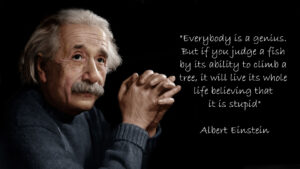
Publications
| Sr. No | Article Title & Author Name | Article |
|---|---|---|
| 24 | Enhanced Acetone Sensing Performance of Silver–Doped Tin Oxide (Sn₁₋ₓAgₓO) Thick Films Synthesized via Hydrothermal Method | View |
| 23 | RECENT TRENDS IN NANOSTRUCTURED MATERIALS FOR GAS SENSING APPLICATIONS | View |
| 22 | Synthesis, Characterization And Optical Properties Of Samarium Doped Sno2 Nanoparticles | View |
| 21 | Current Research in Science and Technology | View |
| 20 | Synthesis and Structural Properties of Lanthanium Doped Tin Dioxide Nanocrystalline. by Dr. L.P. Chikhale. | View Article |
| 19 | Synthesis and Optical Properties of Lanthanium Doped Nanocrystalline Tin Dioxide Thick Films. by Dr. L.P. Chikhale. | View Article |
| 18 | Effect of Bi doping on structural, morphological, optical and ethanol vapor response properties of SnO2 nanoparticles. by Dr. L.P. Chikhale. | View Article |
| 17 | Gas sensing performance of hydrothermally grown CeO2–ZnO composites. by Dr. L.P. Chikhale. | View Article |
| 16 | Co-precipitation synthesis of nanocrystalline SnO2: Effect of Fe doping on structural, morphological and ethanol vapor response properties. by Dr. L.P. Chikhale. | View Article |
| 15 | Synthesis and enhanced ethanol sensing performance of nanostructured Sr doped SnO2 thick film sensor. by Dr. L.P. Chikhale. | View Article |
| 14 | Facile Co-precipitation synthesis and ethanol sensing performance of Pd loaded Sr doped SnO2 nanoparticles. by Dr. L.P. Chikhale. | View Article |
| 13 | Magnetic, Electric and Optical Properties of Mg-Substituted Ni-Cu-Zn Ferrites. by Dr. L.P. Chikhale. | View Article |
| 12 | Structural, Optical and Ethanol Sensing Properties of Dy-Doped SnO2 Nanoparticles. by Dr. L.P. Chikhale. | View Article |
| 11 | Synthesis, characterization and enhanced acetone sensing performance of Pd loaded Sm doped SnO2 nanoparticles. by Dr. L.P. Chikhale. | View Article |
| 10 | Microwave synthesis and acetone sensing properties of WO3 hierarchical nanostructures. by Dr. L.P. Chikhale. | View Article |
| 9 | Structural, morphological and ethanol sensing properties of Ru:Sr-SnO2 nano-composite. by Dr. L.P. Chikhale. | View Article |
| 8 | Structural characterization of zinc substituted magnesium ferrites by co-precipitation technique using oxalate precursors. by Dr. L.P. Chikhale. | View Article |
| 7 | Structural, optical and gas sensing properties of screen-printed nanostructured Sr-doped SnO2 thick film sensor. by Dr. L.P. Chikhale. | View Article |
| 6 | Structural, morphological and gas sensing properties of undoped and Lanthanum doped nanocrystalline SnO 2 (40) 2179–2186. by Dr. L.P. Chikhale. | View Article |
| 5 | Synthesis, structural and optical properties of Fe-doped nanocrystalline SnO2. DOI 10.1007/s 10854-017-7018-z. by Dr. L.P. Chikhale. | View Article |
| 4 | Synthesis, characterization and LPG response of Pd loaded Fe doped tin oxide thick films (608) 133-140. by Dr. L.P. Chikhale. | View Article |
| 3 | Enhanced acetone sensing performance of nanostructured Sm2O3 doped SnO2 thick films (35) 813–823. by Dr. L.P. Chikhale. | View Article |
| 2 | Synthesis and enhanced ethanol sensing performance of nanostructured Sr doped SnO2 thick film sensor DOI 10.1007/s 10854-016-5901-7. by Dr. L.P. Chikhale. | View Article |
| 1 | Structural, morphological and gas sensing properties of undoped and Lanthanum doped nanocrystalline SnO2. by Dr. L.P. Chikhale. | View Article |
E-Content
E-Content of Physics
| Sr. No | Title | Google form Test/ Video/ Study material | Link |
|---|---|---|---|
|
|
Youtube Channel Department of Physics | YouTube Channel Study Video | YouTube Channel |
| 1 | Quiz-1 (B.Sc First Year) Physics | Google form | Attempt Test |
| 2 | Quiz-2 Oscillation (B.Sc First Year) | Google form | Attempt Test |
| 3 | Quiz-3 Light and Electricity (B.Sc First Year) | Google form | Attempt Test |
| 4 | Quiz-4 Magnetism and Electromagnetism (B.Sc First Year) | Google form | Attempt Test |
| 5 | Quiz-5 Atomic Physics (B.Sc Third Year) | Google form | Attempt Test |
| 6 | Quiz-6 Physics General Science GK Objective Multiple Choice Questions online Test (B.Sc First Year) | Google form | Attempt Test |
| 7 | Quiz-7 Astrophysics (B.Sc Third Year) | Google form | Attempt Test |
| 8 | Quiz-8 Rotational Dynamics (B.Sc First Year) | Google form | Attempt Test |
| 9 | MCQ Quiz - Physics - Mechanics - Rotational Dynamics | Study Material | View |
| 9 | Superposition of Waves Part 1 | Youtube Video | View |
| 10 | Superposition of Waves Part 2 | Youtube Video | View |
| 11 | Superposition of Waves Part 3 | Youtube Video | View |
| 12 | Superposition of Waves Part-4 | Youtube Video | View |
| 13 | Superposition of Waves Part 5 | Youtube Video | View |
| 14 | Superposition of waves Part 6 | Youtube Video | View |
| 15 | Superposition Of Waves | Youtube Video | View |
| 16 | Superposition of waves II | Youtube Video | View |
| 17 | Superposition of Waves | Youtube Video | View |
| 18 | Rotational Dynamics Part 1 | Youtube Video | View |
| 19 | Rotational Dynamics Part 2 | Youtube Video | View |
| 20 | Rotational Dynamics Part 3 | Youtube Video | View |
| 21 | Rotational Dynamics Part 4 | Youtube Video | View |
| 22 | Rotational Dynamics Part 5 | Youtube Video | View |
| 23 | Rotational Dynamics Part 6 | Youtube Video | View |
| 24 | Rotational Dynamics Part 7 | Youtube Video | View |
| 25 | Rotational Dynamics Part 8 | Youtube Video | View |

